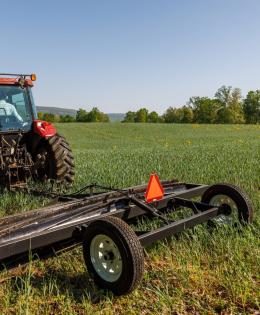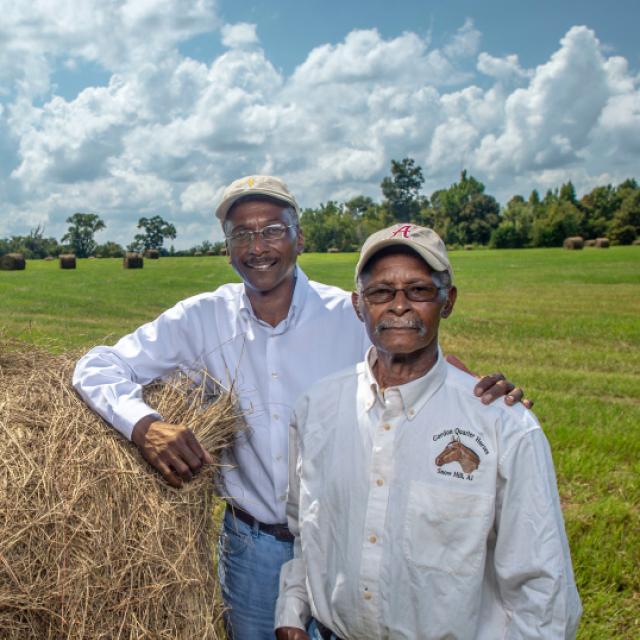

Who We Are and What We Do
With the mission of “Helping People Help the Land,” NRCS Tennessee provides products and services that enable people to be good stewards of the Nation’s soil, water, plants and other related natural resources on private lands through voluntary conservation efforts.
Tennessee State Office
Popular Conservation Topics
Public Affairs
Here you’ll find the latest information on USDA-NRCS activities in Tennessee, including news releases, success stories, videos, and more.
Click here to enter.

Outreach
Tennessee outreach provides leadership and assistance to ensure that all programs and services are made accessible to all NRCS customers, fairly and with emphasis on reaching historically underserved farmers and ranchers.
Click here to enter.

Earth Team
The Earth Team is the volunteer workforce of the NRCS and we are making a difference in every county in the nation.
NRCS partners with conservation groups and others to ensure private lands are conserved, restored, and more resilient to environmental challenges like climate change. Working side-by-side with farmers and ranchers, the NRCS identifies natural resource concerns, such as soil erosion and water quality issues, and develops unique conservation plans for restoring and protecting resources.
Click here to enter.

My NRCS Career
Welcome to My NRCS Career!
Whether you are an established NRCS employee looking for career path information or you are browsing potential careers with NRCS for the first time, this website will provide the information you are seeking. You can:
- Learn about life at NRCS Federal employment, or current job openings with NRCS
- Plan your career using career maps and career guide information for NRCS occupations.
- Learn about our current employment programs for students and recent graduates
Click here to enter.

Soil Health
Soil Life in Tennessee
Soil is a living and life-giving substance, without which we would perish. As world population and food production demands rise, keeping our soil healthy and productive is of paramount importance. So much so that we believe improving the health of our Nation’s soil is one of the most important conservation endeavors of our time. The resources on this soil health section of our site are designed to help visitors understand the basics and benefits of soil health—and to learn about Soil Health Management Systems from farmers who are using those systems.
Click here to enter.

Urban Agriculture
NRCS serves all agriculture – large to small, conventional to organic, rural to urban. As American agriculture continues to grow in new directions, NRCS conservation assistance is growing along with it.
Click here to enter.

Engineering
Our staff is dedicated to assisting farmers, ranchers and partners with sound engineering practices and assistance.
Click here to enter.

Ecological Sciences
The Tennessee Ecological Sciences provide technical resources and training to support conservation delivery to farmers and ranchers through our conservation planning process and provides technical expertise related to agronomy, biology, grazing lands, water quality and NEPA.
Click here to enter.

There are three phases to the nine-step conservation planning process.

State Payment Schedule
NRCS provides financial assistance for selected conservation practices. The availability and amount of financial assistance can vary between states.
State Technical Committee
State Technical Committees serve in an advisory capacity to the Natural Resources Conservation Service (NRCS) and other agencies of the U.S. Department of Agriculture (USDA) on the implementation of the natural resources conservation provisions of Farm Bill legislation.
How to Get Assistance
Do you farm or ranch and want to make improvements to the land that you own or lease?
Natural Resources Conservation Service offers technical and financial assistance to help farmers, ranchers and forest landowners.

To get started with NRCS, we recommend you stop by your local NRCS field office. We’ll discuss your vision for your land.
NRCS provides landowners with free technical assistance, or advice, for their land. Common technical assistance includes: resource assessment, practice design and resource monitoring. Your conservation planner will help you determine if financial assistance is right for you.
We’ll walk you through the application process. To get started on applying for financial assistance, we’ll work with you:
- To fill out an AD 1026, which ensures a conservation plan is in place before lands with highly erodible soils are farmed. It also ensures that identified wetland areas are protected.
- To meet other eligibility certifications.
Once complete, we’ll work with you on the application, or CPA 1200.
Applications for most programs are accepted on a continuous basis, but they’re considered for funding in different ranking periods. Be sure to ask your local NRCS district conservationist about the deadline for the ranking period to ensure you turn in your application in time.
As part of the application process, we’ll check to see if you are eligible. To do this, you’ll need to bring:
- An official tax ID (Social Security number or an employer ID)
- A property deed or lease agreement to show you have control of the property; and
- A farm number.
If you don’t have a farm number, you can get one from USDA’s Farm Service Agency. Typically, the local FSA office is located in the same building as the local NRCS office. You only need a farm number if you’re interested in financial assistance.
NRCS will take a look at the applications and rank them according to local resource concerns, the amount of conservation benefits the work will provide and the needs of applicants. View Application Ranking Dates by State.
If you’re selected, you can choose whether to sign the contract for the work to be done.
Once you sign the contract, you’ll be provided standards and specifications for completing the practice or practices, and then you will have a specified amount of time to implement. Once the work is implemented and inspected, you’ll be paid the rate of compensation for the work if it meets NRCS standards and specifications.









